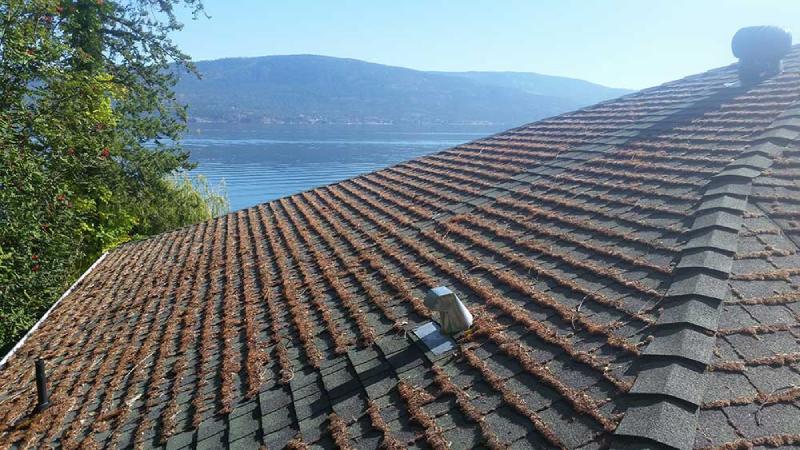How to prevent moss growth on your roof
How to prevent moss growth on your roof

When homeowners first realize they have a moss problem, they often ask the question “How do I prevent moss growth on my roof?”. Moss and algae can be frustrating to deal with, so it’s natural to look for permanent solutions. However, the most cost-efficient and overall effective solution to prevent moss from growing on your roof is often a combination of pruning and periodic maintenance cleaning.
We’ll explore four different strategies to help you understand your options, and how you can best prevent moss from growing on your roof.
The first and most expensive option to keeping your roof clear of moss is by choosing a roof type that doesn’t naturally grow moss: metal roofing.
The most common type of metal roofing seen in the lower Mainland are steel roofs, which can be a good option, albeit an expensive one. These roofs do not necessarily repel organic growth, but they don’t provide a porous base for moss to establish itself on.
On the other hand, it’s common in Europe to use Zinc as the primary material in roofing. If you’ve been downtown Vancouver recently may notice that Christ Church Catherdral just put on a new Zinc roof. If you had seen the old roof you would have known that it had been torn apart by moss and algae.
Choosing the right roofing type may be an effective but expensive option for homeowners looking to prevent moss from growing on their roof, but what about homeowners with existing roofs?
Another way to prevent moss from growing on your roof is by installing copper or zinc strips on your roof. These work by the strips releasing small amounts of zinc and copper into rainwater that falls on them, which runs downs the roof and deters moss growth.
However, there are a few main challenges with zinc strips. First, they are a leak risk for your roof. The Asphalt Roof Manufactures association clearly prohibits the installation of zinc strips to pre-existing roofs as their installation would require breaking the waterproof seal of a properly installed roof.
Second, zinc strips work for five feet, for five years, according to studies done by the University of Oregon. That means you need to periodically replace your zinc strips, as well as install multiple layers of them on your roof to effectively prevent moss from growing on your roof.
Given both the risk and ineffectiveness of this approach, we recommend not installing zinc strips on your roof to prevent moss growth.
Pruning nearby trees can help you prevent moss from growing on your roof in two ways. First, moss begins to grow on your roof as moss spores land from nearby moss patches, which generally can be found on mature trees. If you have any of these trees near your roof line, pruning back branches (especially branches with visible moss) can substantially increase how long it takes for moss to grow on your roof.
Second, pruning back your trees will increase your roof’s sunlight exposure, and limit the amount of moisture that’s able to dwell on your roof. Reducing the moisture on your roof will delay moss growth and help extend your roof life.
The final method for preventing moss growth on your roof is regular roof cleaning treatments. Roof cleaning treatments are generally only needed every 4-6 years, and when done correctly can prevent any substantial amount of moss from growing on your roof.
Chemical treatments work by killing moss that’s beginning to grow on your roof. Because it takes multiple years for moss establish itself, these roof cleaning treatments essentially “nip in the bud” any moss growth. By resetting the moss growth cycle every 4-6 years, homeowners can prevent any substantial or damaging amount of moss from ever growing on their roofs.
This method is recommending by the Asphalt Roofing Manufacturers Association (ARMA) and is also effective for preventing moss growth on concrete tile and cedar shake roofs.
No matter what type of roof you have, West Coast Moss Removal has the expertise to help you prevent moss from growing on your roof. We recommend both pruning and periodic roof cleaning treatments and offer both services. Call us today to get your free estimate.